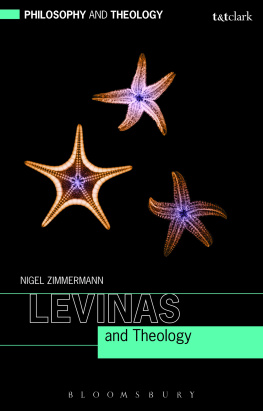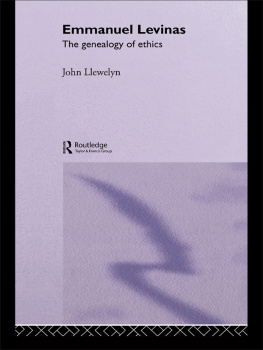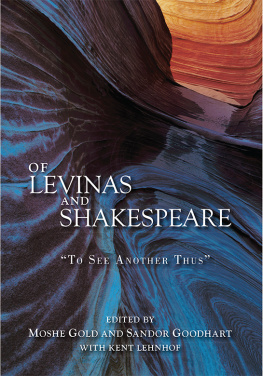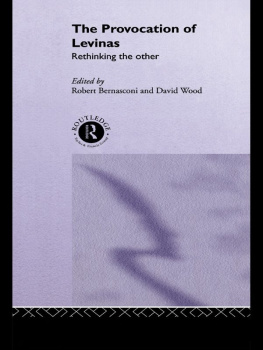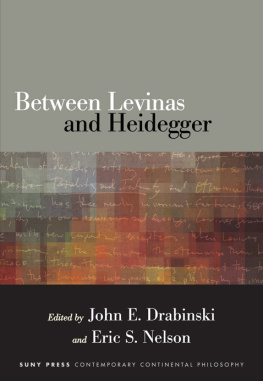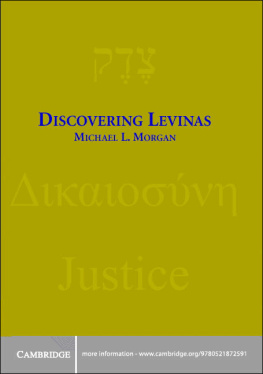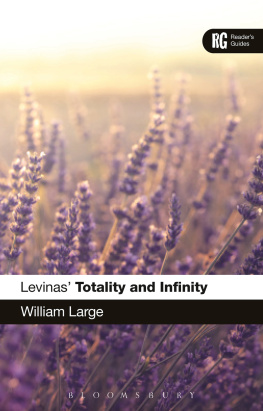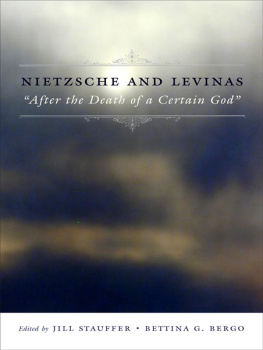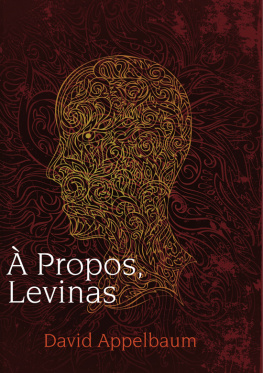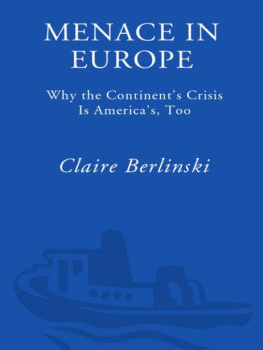Claire Elise Katz - Levinas and the Crisis of Humanism
Here you can read online Claire Elise Katz - Levinas and the Crisis of Humanism full text of the book (entire story) in english for free. Download pdf and epub, get meaning, cover and reviews about this ebook. year: 2013, publisher: Indiana University Press, genre: Religion. Description of the work, (preface) as well as reviews are available. Best literature library LitArk.com created for fans of good reading and offers a wide selection of genres:
Romance novel
Science fiction
Adventure
Detective
Science
History
Home and family
Prose
Art
Politics
Computer
Non-fiction
Religion
Business
Children
Humor
Choose a favorite category and find really read worthwhile books. Enjoy immersion in the world of imagination, feel the emotions of the characters or learn something new for yourself, make an fascinating discovery.

- Book:Levinas and the Crisis of Humanism
- Author:
- Publisher:Indiana University Press
- Genre:
- Year:2013
- Rating:3 / 5
- Favourites:Add to favourites
- Your mark:
- 60
- 1
- 2
- 3
- 4
- 5
Levinas and the Crisis of Humanism: summary, description and annotation
We offer to read an annotation, description, summary or preface (depends on what the author of the book "Levinas and the Crisis of Humanism" wrote himself). If you haven't found the necessary information about the book — write in the comments, we will try to find it.
Levinas and the Crisis of Humanism — read online for free the complete book (whole text) full work
Below is the text of the book, divided by pages. System saving the place of the last page read, allows you to conveniently read the book "Levinas and the Crisis of Humanism" online for free, without having to search again every time where you left off. Put a bookmark, and you can go to the page where you finished reading at any time.
Font size:
Interval:
Bookmark:
LEVINAS AND THE CRISIS OF HUMANISM
CLAIRE ELISE KATZ
CRISIS OF HUMANISM

This book is a publication of
Indiana University Press
601 North Morton Street
Bloomington, Indiana 47404-3797 USA
iupress.indiana.edu
Telephone orders 800-842-6796
Fax orders 812-855-7931
2013 by Claire Elise Katz
All rights reserved
No part of this book may be reproduced or utilized in any form or by any means, electronic or mechanical, including photocopying and recording, or by any information storage and retrieval system, without permission in writing from the publisher. The Association of American University Presses Resolution on Permissions constitutes the only exception to this prohibition.
 The paper used in this publication meets the minimum requirements of the American National Standard for Information SciencesPermanence of Paper for Printed Library Materials, ANSI Z39.48-1992.
The paper used in this publication meets the minimum requirements of the American National Standard for Information SciencesPermanence of Paper for Printed Library Materials, ANSI Z39.48-1992.
Manufactured in the United States of America
Library of Congress Cataloging-in-Publication Data
Katz, Claire Elise, [date]
Levinas and the crisis of humanism / Claire Elise Katz.
p. cm.
Includes bibliographical references and index.
ISBN 978-0-253-00762-9 (cloth : alk. paper) ISBN 978-0-253-00765-0 (pbk. : alk. paper) ISBN 978-0-253-00767-4 (electronic book) 1. Lvinas, Emmanuel. 2. EducationPhilosophy. 3. HumanitiesPhilosophy. I. Title.
B2430.L484K37 2012
144dc23
2012026292
1 2 3 4 5 18 17 16 15 14 13
To Dan, for everything
and to our daughters
Olivia and Evie
Deuteronomy 22:3
Here I am; send me (Isaiah 6:8)
But in truth I know nothing about education except this: that the greatest and the most important difficulty known to human learning seems to lie in that area which treats how to bring up children and how to educate them.
Michel de Montaigne, On educating children
This crippling of individuals I consider the worst evil of capitalism. Our whole educational system suffers from this evil. An exaggerated competitive attitude is inculcated into the student, who is trained to worship acquisitive success as a preparation for his future career. I am convinced there is only one way to eliminate these grave evils, namely through the establishment of a socialist economy, accompanied by an educational system which would be oriented toward social goals. In such an economy, the means of production are owned by society itself and are utilised in a planned fashion. A planned economy, which adjusts production to the needs of the community, would distribute the work to be done among all those able to work and would guarantee a livelihood to every man, woman and child. The education of the individual, in addition to promoting his own innate abilities, would attempt to develop in him a sense of responsibility for his fellow-men in place of the glorification of power and success in our present society.
Albert Einstein, On Education (1949)
And here I am not speaking of the elite among us who were real Resistants, but of all Frenchmen who, at every hour of the night and day throughout four years, answered NO. But the very cruelty of the enemy drove us to the extremities of this condition by forcing us to ask ourselves questions that one never considers in time of peace... Resistance was a true democracy: for the soldier as for the commander, the same danger, the same forsakenness, the same total responsibility, the same absolute liberty within discipline. Thus, in darkness and in blood, a Republic was established, the strongest of Republics. Each of its citizens knew that he owed himself to all and that he could count only on himself alone. Each of them, in complete isolation, fulfilled his responsibility and his role in history.
Jean-Paul Sartre, The Republic of Silence
In many ways, I have been writing this book since I was an undergraduate discussing education with my grandparents when I shared Friday night dinners with them. My grandfather, zl, a retired college professor and a fan of John Deweys philosophy of education, was a formidable interlocutor. My grandmother, with an advanced degree in library science from Columbia University, could hold her own. It was around their kitchen table that they pressed me to reflect on the college education I pursued. From my freshman year, which began with my interest in computer science, to my senior year, when I completed a degree in philosophy, my grandparents watched me transform from a student interested in mathematical puzzles to a citizen engaged in the world, obsessed with questions about ethics and justice, fascinated by philosophical problems, and convinced, even if navely so, that education was the answer to all of the worlds ills.
Influenced by these discussions, I traded my interest in law to pursue the Masters degree in the Philosophy for Children program. I remain convinced of the programs ability to improve critical thinking and engage young people in philosophical questions such that they are able to find meaning in the world around them and the lives they live. But I am no more convinced that this program is sufficient to make children better people, where better means more ethical, or that my own humanities education made me or any other humanities student a better person.
Engaging the humanities might enable us to be more reflective, to ask critical questions, to consider different perspectives, and to think more creatively. I do not believe, however, that it creates the desire or establishes the motivation for us to act ethically or justly. Yet, the view that the humanities do in fact accomplish this task has become part of humanities education rhetoric. Moreover, this view frames the narrative that is often told to those who are responsible for fundingand frequently suspicious ofhigher education. The aim of this book is not to provide a manifesto for or against the humanities. Rather, I wish to take a step back and examine what informs the way an individual might receive that education. Who is this person before she engages the humanities?
When I teach Emmanuel Levinass philosophical project, the question my students ask me repeatedly is the following: How does one become the ethical subject that Levinas describes? Some might say this is the wrong question to ask. The question presumes that the strict phenomenological reading is limited and that Levinas is not simply describing who we are. After reading his essays on Jewish education alongside his philosophical project, I remain convinced that my students question is precisely the right question to ask. How indeed does someone become an ethical subject?
This book attempts to answer that question by first examining the role that Levinass essays on Jewish education play in understanding his larger philosophical project. I then consider why Levinas turns to Jewish education and not a classical humanities education to answer this question. There are two simultaneous and possibly competing visions of ethical subjectivity. On the one hand, Levinas is interested in the ethical subject who will not be a murderous self in the first place. Yet, on the other, he is also interested in the person who, like the prophet, will not only see injustice but also cry out against it.
The seeds of this project were planted many years ago, but the trajectory of the project shifted when life events provided the intersection for theory and practice. Several years after I completed my PhD, I was confronted with just such a situation. We do not often get to see our friends or colleagues mettle tested. Depending on how they respond, it can be inspiring or disappointing. The department in which I was a faculty member had imploded. A colleague had been harassing graduate students. My department head reported his behavior to the university Affirmative Action office. About ten days later, henot the person doing the harassingwas summarily relieved of his headship position. The department fell into chaos and then suffered a series of humiliations including being called whiners by upper administration for demanding that something be done about the bad behavior in the department (one can only wonder about the future success of K-12 programs to stop bullying when those with the highest degrees in education call those who speak out against such behavior whiners).
Next pageFont size:
Interval:
Bookmark:
Similar books «Levinas and the Crisis of Humanism»
Look at similar books to Levinas and the Crisis of Humanism. We have selected literature similar in name and meaning in the hope of providing readers with more options to find new, interesting, not yet read works.
Discussion, reviews of the book Levinas and the Crisis of Humanism and just readers' own opinions. Leave your comments, write what you think about the work, its meaning or the main characters. Specify what exactly you liked and what you didn't like, and why you think so.

